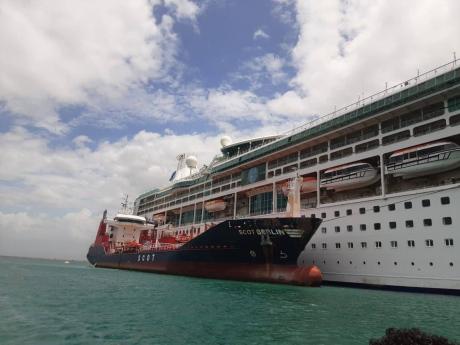Bunkering: Fuelling Jamaica’s maritime trade
When a ship calls into port, a great deal of arrangement needs to be made in advance of the vessel’s arrival. Coordinating ship and fresh water supplies, as well as crew transfer logistics from ship to port, are just some of the activities that must take place. Critical among them is the provision of fuel for the vessel through a process known as bunkering.
Historically, steam was a dominant source of power in both land and sea transport – commonly, steamships fed coal into large furnaces on board vessels. The storage units for the coal were known as bunkers. As early as the 1970s, the port of Kingston was made popular for bunkering with the advent of the blockade on Cuba by the United States during the Cold War. All Russian vessels leaving Cuba would stop in the port of Kingston for bunkering for the long journey home.
Today, marine bunkering services supply vessels with high sulphur fuel oil, very low sulphur fuel oil or low sulphur fuel oil, which is used as energy for propulsion, heat, and light. On average, on the international fuel market, the cost may vary between $350 and $450 per metric ton. The quantity to supply depends on the carrying capacity of the supply barge or vessel.
Boasting the only maritime university in the English-speaking Caribbean and ranked as one of the top container trans-shipment facilities handling cargo in the region, Jamaica has been making strides to become a true logistics hub. Our geographical location, in the centre of the maritime trade lane, has proved advantageous for the country to also make its mark as a major bunkering hub in the Caribbean. Jamaica currently has three bunker supply companies in operation – West Indies Petroleum (WIP), Scott Petroleum and Bunker One (Jamaica).
While explaining the diverse yet crucial role bunkering has played to the port of Kingston and to maritime trade, Leon Campbell, general manager at Lannaman and Morris Shipping Limited, who represents WIP, shared, “Bunkering has brought a lot of business to Kingston. Not only has it supported us, the port agents, but it has provided business to pilots, the Port Authority of Jamaica, Customs and boat operators.”
He continued, “At times when ships call in to port for bunkering, they may end up doing other services such as taking provisions, which provides earnings for ship handlers. It [bunkering] is essential because it provides a range of opportunities for employment to every area of maritime trade.”
Donald Barrant, operations manager at Maritime and Transport Services Limited, the shipping agent for Scott Petroleum, explained, “Jamaica’s position in the Caribbean has been ideal. We are in the main shipping lane leading to the Panama Canal, which from a trade perspective has many advantages. We have seen an increase in bunkering operations, even in the framework of COVID-19. Many vessels coming out of the Panama Canal pass through our waters, some mainly for fuel before continuing their journey. As the shipping agent, we get in touch with all stakeholders to ensure that the relevant suppliers have the bunker necessary for the ship. Similar with your car, each ship has its own specifications for fuel.”
For a bunker trader, contacting ship charterers and bidding on the prices of the respective type of fuel to gain the best offer is the first step in the process. The trader then provides a supplier with the confirmation of the vessel’s details, including the type of vessel, estimated time of arrival to the port to effect supply, quantity and type of fuel, hose type connection, pump rate, among other details.
WELL-NEEDED INCOME
While echoing the sentiments shared by Barrant, Captain Michael Campbell, operations manager at Scott Petroleum, delved further into the economic impact, noting, “The bunker industry, with its constant flow of vessels calling in to our ports for fuel, provides a lucrative source of well-needed foreign exchange to the Jamaican economy. Bunker suppliers employ qualified maritime students to work on supply barges as cargo officers, engineers and able-bodied seamen. Certainly, our proximity has positively influenced the bunker service. We have established a solid reputation of professionalism, some ship transiting routes passing Jamaica often call for bunker only, before continuing to their scheduled destinations.”
On the impact of the global health pandemic, Captain Campbell explained, “COVID-19 has created quite a few challenges and added to the complexities of the operations. The ship owner’s surveyor, vessel’s chief engineer charterers and bunker supplier must agree to COVID-19 protocols, which include policies regarding physical contact before bunker operations commence. Measures including social distancing, recommended by the Center for Disease Control and Prevention and the World Health Organization, have been implemented but not limited to the wearing of personal protective equipment as per paragraph 8.4 of the Marine Environment Protection Committee .1/Circ .875/Add.1 Guidance on Best Practice for Fuel oil suppliers for Assuring the Quality of Fuel Oil Delivered to Ships.”
The standards for bunkering are governed by the International Convention for Prevention of Marine Pollution For Ships, Annex I, which speaks to fuel quality and regulation of bunker operations. The Maritime Authority of Jamaica has established and issued a Code of Bunker, which sets out the standard for bunkering in Jamaica to bunker suppliers.
In January of this year, the International Maritime Organization (IMO), implemented its IMO 2020 regulation – which stipulates that vessels are only allowed to use fuel with a maximum sulphur content of 0.50 per cent, as against the previous limit of 3.50 per cent. This measure was implemented to reduce marine pollution and to improve the ecological footprint of the shipping industry. Presently, the local refinery provides low sulphur distillates, in compliance with the regulation.


![Credit: Contributed West Indies Petroleum bunkering [??]](http://cmslocal.gleanerjm.com/sites/default/files/styles/jg_article_image/public/media/article_images/2020/10/27/998141/4094353.jpg?itok=iqdhBZS8)